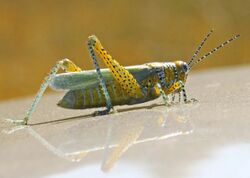Biology:Poecilotettix
From HandWiki
Short description: Genus of grasshoppers
| Poecilotettix | |
|---|---|

| |
| Poecilotettix pantherinus | |
| Scientific classification | |
| Domain: | Eukaryota |
| Kingdom: | Animalia |
| Phylum: | Arthropoda |
| Class: | Insecta |
| Order: | Orthoptera |
| Suborder: | Caelifera |
| Family: | Acrididae |
| Subfamily: | Melanoplinae |
| Tribe: | Dactylotini |
| Genus: | Poecilotettix Scudder, 1897 |
Poecilotettix is a genus of spur-throated grasshoppers in the family Acrididae and the tribe Dactylotini. There two known described species in Poecilotettix.[1][2][3][4][5]
Species
These two species belong to the genus Poecilotettix:
- Poecilotettix pantherinus (Walker, F., 1870) c g b (panther-spotted grasshopper)
- Poecilotettix sanguineus Scudder, 1897 i c g b (red-lined grasshopper)
Data sources: i = ITIS,[1] c = Catalogue of Life,[2] g = GBIF,[3] b = Bugguide.net[4]
References
- ↑ 1.0 1.1 "Poecilotettix Report". https://www.itis.gov/servlet/SingleRpt/SingleRpt?search_topic=TSN&search_value=657766. Retrieved 2018-04-25.
- ↑ 2.0 2.1 "Browse Poecilotettix". http://www.catalogueoflife.org/col/browse/tree/id/e28eec0ae5c160fdc2808c4ab3440c6f. Retrieved 2018-04-25.
- ↑ 3.0 3.1 "Poecilotettix". https://www.gbif.org/species/1710201. Retrieved 2018-04-25.
- ↑ 4.0 4.1 "Poecilotettix Genus Information". https://bugguide.net/node/view/139231. Retrieved 2018-04-25.
- ↑ "genus Poecilotettix Scudder, 1897". orthoptera.speciesfile.org. http://orthoptera.speciesfile.org/Common/basic/Taxa.aspx?TaxonNameID=1109840. Retrieved 2020-06-02.
Further reading
- Bland, Roger (2003). The Orthoptera of Michigan: Biology, Keys, and Descriptions of Grasshoppers, Katydids, and Crickets. Michigan State University Extension. ISBN 978-1565250178.
- Capinera, J. L; Scott, R. D.; Walker, T. J. (2004). Field Guide to Grasshoppers, Katydids, and Crickets of the United States. Cornell University Press. ISBN 978-0-8014-8948-8. https://archive.org/details/fieldguidetogras0000capi.
Wikidata ☰ Q10635678 entry
 |

